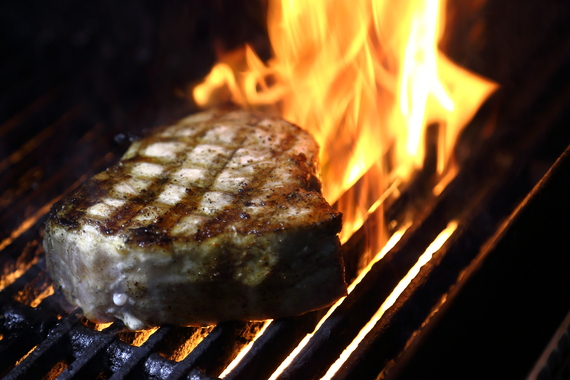In a nutshell, calculus is the mathematical study of change. One of the most common curiosities about my lifestyle is the connection between mathematics and cooking and I get the obvious questions like, "So, you measure really precisely?" or "It must help when you are baking." My sincere response is usually along the lines of 'Well, both professions demand a degree of problem-solving ability." The more I've thought about this, the more I realize that if anything, the two seemingly different activities (doing/teaching mathematics and cooking professionally) complement each other. I am more demanding and direct with my expectations in the classroom and I am able to provide very logical explanations for my expectations in the kitchen. Of course, multitasking is made easier when one is able to compartmentalize the various tasks on hand in small pockets of the brain which can communicate with each other quickly. Having first been trained as a mathematician, at least that part of my brain (at least for now) is able to do that.
But this piece is more about the relationship between calculus and cooking. The rate at which an ingredient cooks whether it is by the application of heat or enzymatically has a lot to do with whether or not a chef is successful in achieving the desired texture and flavor. Take the example of cooking rice. There are well-known mathematical models which describe very precisely the rate at which each grain of rice absorbs water as it is being cooked. The same is true for pasta, proteins, and vegetables. A chef who wants to be able to precisely control every aspect of this would be practicing molecular gastronomy. Proteins become denatured (essentially this refers to when a change in the shape of their molecule occurs) at different rates. However, the beginning temperature has a lot to do with the how quickly the end state is reached. So, taking a steak out of the refrigerator and letting it come to room temperature will allow it to cook much faster than if it goes on the grill directly from a cold environment. Of course, this seems obvious, but too often, we are scared into thinking that uncooked meat left for any amount of time outside a cold environment will result in food spoilage and possible illness.
Does a home cook need to know any of this? The answer is of course not, but it does help to think about cooking as you would about any project involving multiple steps. With cooking, the amateur cook has a tendency to take some short cuts to try to achieve the end result which is the enjoyment of the meal. When the initial preparation (mise en place) is not thought through, the rate of cooking may be harder to control. Another culprit is to not control the agent of cooking which may be the flame of the stove top or know where the hot spots of the grill or oven might be. A famous celebrity chef would often make light of how the home cook might often turn the flame on high and walk away, only returning to a burnt result. It's all about the rate of cooking. As chefs on the line, night in and night out, we are constantly juggling the knobs of our burners to various levels. All of this is to be able to respect the calculus of cooking. It's just science and we don't make those rules. We're simply trying to stay between acceptable standards. Personally, I love a hot kitchen and having an air-conditioning vent blowing on me only detracts from my ability to control the calculus of my cooking.
